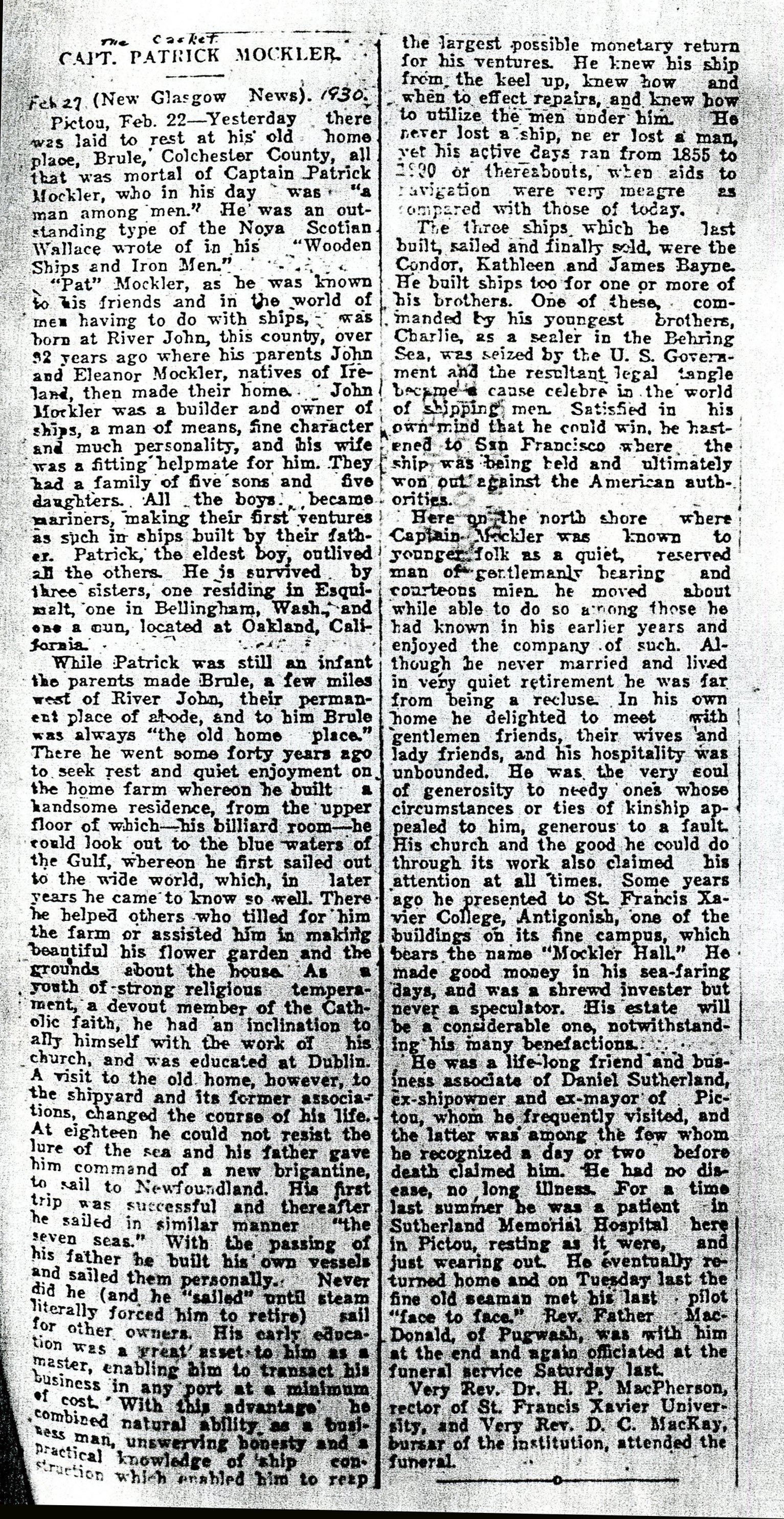
CAPT. PATRICK MOCKLER
Feb. 27 (New Glasgow News) 1930
Pictou, February 22―Yesterday there was laid to rest at his old home place, Brule, Colchester County, all that was mortal of Captain Patrick Mockler, who in his day was a “man among men.” He was an outstanding type of the Nova Scotian Wallace wrote of in his “Wooden Ships and Iron Men.”
“Pat” Mockler, as he was known to his friend and in the world having to do with ships, was born at River John, this county, over 82 years ago where his parents John and Eleanor Mockler, natives of Ireland, made their home. John Mockler was a builder and owner of ships, a man of means, fine character and much personality, and his wife was a fitting helpmate for him. They had a family of five sons and five daughters. All the boys became mariners, making their first ventures as such in ships built by their father. Patrick, the eldest boy, outlived all the others. He is survived by three sisters, one residing in Esquimalt, one in Bellingham, Wash., and one a nun located at Oakland, California.
While Patrick was still an infant the parents made Brule, a few miles west of River John, their permanent place of abode, and to him, Brule was always “the old home place.” There he went some forty years ago to seek rest and quiet enjoyment on the home farm whereon he built a handsome residence, from the upper floor of which―his billiard room―he could look out to the blue waters of the Gulf., whereon he first sailed out to the wide world, which, in later years he came to know so well. There he helped others who tilled for him the farm or assisted him in making his beautiful his flower garden and the grounds about the house. As a youth of strong religious temperament, a devout member of the Catholic faith, he had an inclination to ally himself with the work of his church, and was educated at Dublin. A visit to the old home, however, to the shipyard and its former associations, changed the course of his life. At eighteen he could not resist the lure of the sea, and his father gave him command of a new brigantine to sail to Newfoundland. His first trip was successful and thereafter he sailed in similar manner “the seven seas.” With the passing of his father he built his own vessels and sailed them personally. Never did he (and he “sailed” until steam literally forced him to retire) sail for others owners. His early education was a great asset to him as a master, enabling him to transact his business at any port at a minimum of cost. With this advantage he combined natural ability as a business man, unswerving honesty and a practical knowledge of ship construction which enable him to reap the largest possible monetary return for his ventures. He knew his ship from the keel up, knew how and when to effect repairs, and knew how to utilize the men under him. He never lost a ship, never lost a man., yet his active days ran from 1855 to 1900 or thereabouts, when aids to navigation were very meager as compared to those of today.
The three ships that he last built, sailed and finally sold, were the Condor, Kathleen and James Bayne. He built ships too for one or more of his brothers. One of these, commanded by his youngest brother, Charlie, as a sealer in the Bering Sea, was seized by the U.S. Government and the resultant legal tangle became a cause celebre in the word of shipping men. Satisfied in his own mind that he could win, he hastened to San Francisco where the ship was being held and ultimately won out against the American authorities.
Here on the north shore where Captain Mockler was known to younger folks as a quiet, reserved man of gentlemanly bearing and courteous mien, he moved about while able to do so among those he had known in earlier years and enjoyed the company of such. Although he never married and lived in a very quiet retirement he was far from being a recluse. In his own home he delighted to meet with gentleman friends, their wives and lay friends, and his hospitality was unbounded. He was the very soul of generosity to needy ones whose circumstances or ties of kinship appealed to him, generous to a fault. His church and the good he could do through its work also claimed his attention at all times. Some years ago he presented to St. Francis Xavier College, Antigonish, one of the building on its fine campus, which bears the name, “Mockler Hall.” He made good money in his sea-faring days, and was a shrewd investor but never a speculator. His estate will be a considerable one, notwithstanding his many benefactions.
He was a life-long friend and business associate of Daniel Sutherland, ex-shipowner and ex-mayor of Pictou, whom he frequently visited, and the latter was among the few whom he recognized a day or two before death claimed him. He had no disease, no long illness. For a time last summer he was a patient in Sutherland Memorial Hospital here in Pictou, resting as it were, and just wearing out. He eventually returned home and on Tuesday last the fine old seaman met his last pilot “face to face.” Rev. Father MacDonald of Pugwash was with him at the end and again officiated at the funeral service Saturday last.
Very Rev. Dr. H.P. MacPherson, rector of St. Francis Xavier University, and Very Rev. D.C. MacKay, bursar of the institution, attended the Funeral.
| Contributor: |
|
| Tags: | Patrick Mockler, Capt. Patrick Mockler |
| Views: | 671 |
| Uploaded on: | October 6, 2020 |
| Source: | St. Francis Xavier University Archives |